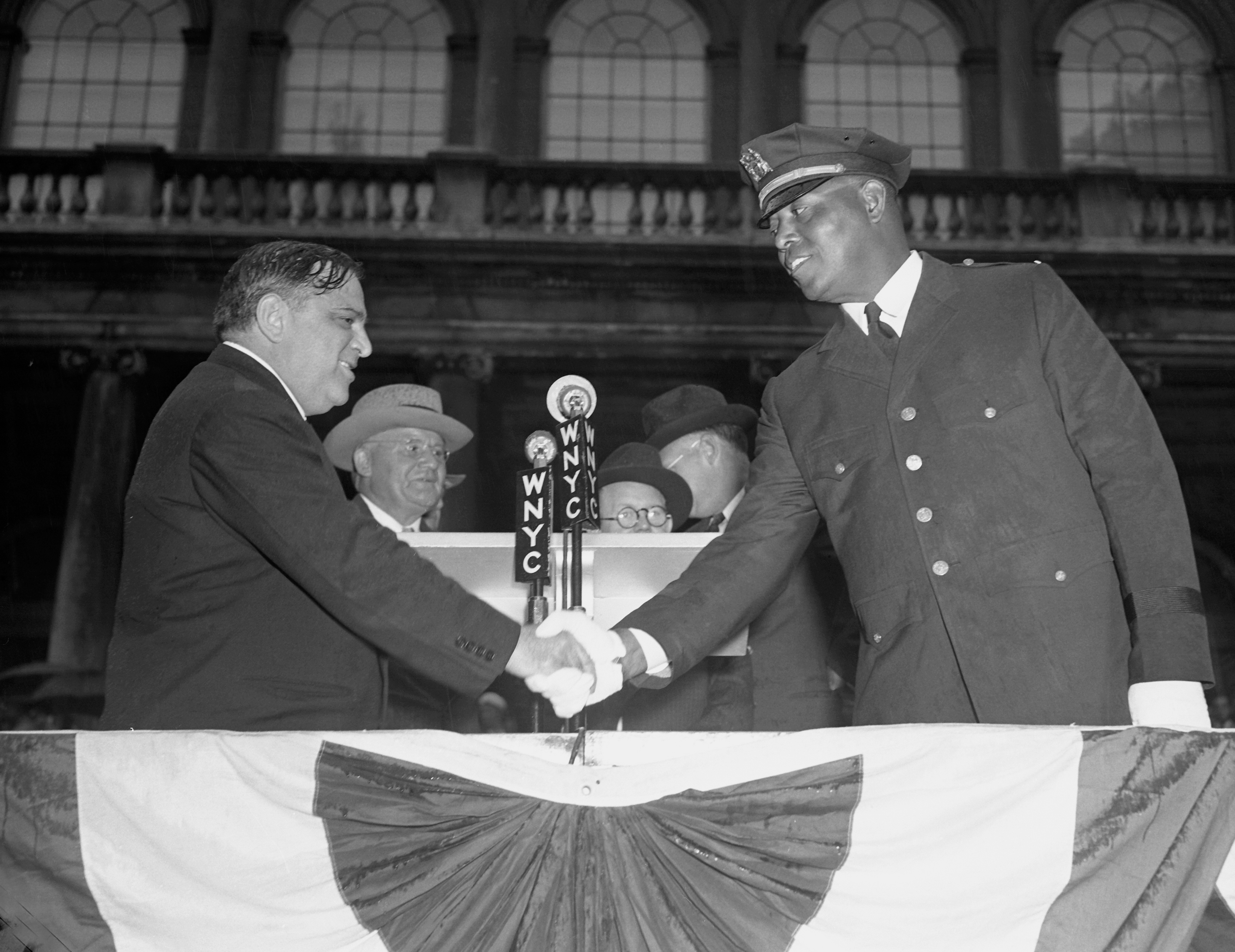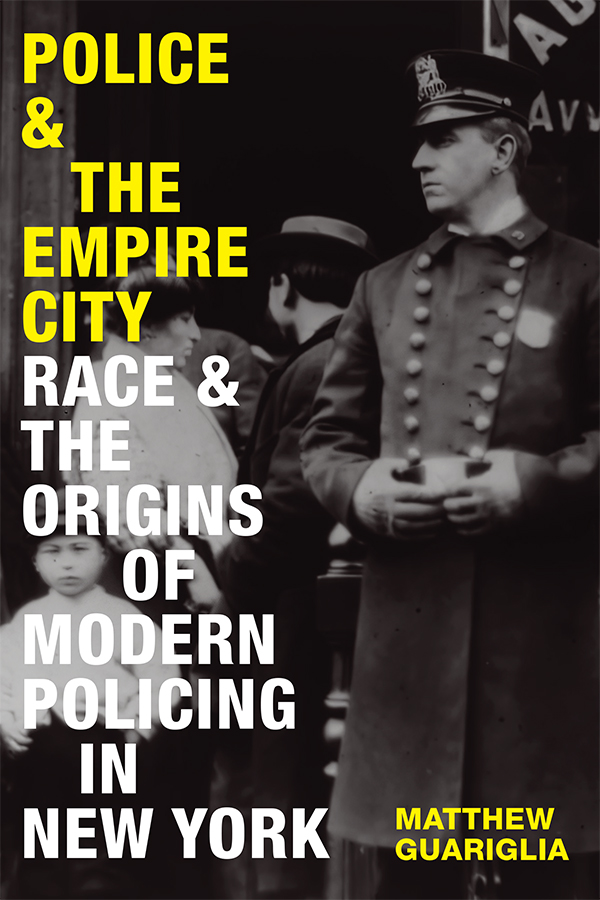
‘Police & the Empire City’ explores race and the origins of the NYPD
February 14, 2024, 9:09 am CST
- !function(d,s,id){var js,fjs=d.getElementsByTagName(s)[0],p=/^http:/.test(d.location)?'http':'https';if(!d.getElementById(id)){js=d.createElement(s);js.id=id;js.src=p+'://platform.twitter.com/widgets.js';fjs.parentNode.insertBefore(js,fjs);}}(document, 'script', 'twitter-wjs'); Tweet
- lang: en_US
-


New York City Mayor Fiorello LaGuardia shakes hands with Lt. Samuel J. Battle as Battle accepts an appointment to the Parole Commission in 1935. Battle was hired in 1911 as the first Black police officer in the New York City. (Photo by John Tresilian/NY Daily News Archive via Getty Images)
In Police & the Empire City: Race & the Origins of Modern Policing in New York, Matthew Guariglia looks at the New York City police from their founding in 1845 through the 1930s as "police transitioned from a more informal collection of pugilists clad in wool coats to what we can recognize today as a modern professionalized police department."
From the beginning, race and ethnicity had a major impact in the policing of New York City. In a city where the top echelons of power were held by Anglo-Dutch Protestants, the streets were patrolled by Irish and German immigrant police officers, sometimes enforcing the Fugitive Slave Act by snatching Black people off the streets and sending them back to enslavement in the South.

In this episode of The Modern Law Library podcast, Guariglia and the ABA Journal’s Lee Rawles discuss what the early period of policing in New York City can tell us about policing today.
Rawles shares her own ancestor’s path from immigrant to police court judge on the West Side of Chicago. (Though the dates that she cites in the interview are incorrect—Michael J. O’Donoghue emigrated from Ireland in 1874 and was appointed to the police court in 1901.)
For Irish and German immigrants, a job on the police force was a path out of poverty and toward whiteness and political power, but you would be asked to prove yourself by visiting violence on your own community.
African American community leaders hoped that the appointment of Black policemen would curb police brutality, but the city was slower than other metropolises like Chicago, who hired James L. Shelton as the city’s first Black officer in 1871. Samuel J. Battle became the New York City Police Department’s first Black police officer in 1911, eventually rising to the rank of lieutenant and being appointed a parole commissioner.
Meanwhile, in neighborhoods like Chinatown, entire communities went without police officers who spoke the same language as inhabitants. The first Chinese-speaking officer was hired in 1904. That same year, the General Slocum disaster sent the city administration scrambling for German-speaking police officers to locate relatives in Kleindeutschland to identify bodies of the thousand victims of the burned shipwreck.
Fears of “the Black Hand” led to the creation of the Italian Squad, and Guariglia shares the story of how the Italian Squad’s founder, Joseph Petrosino, ended up assassinated while on assignment in Sicily.
“Empire City” is an apt name for New York City, as it had international reach and drew on former colonial administrators. One influential police commissioner, Gen. Francis Vinton Greene, had been involved in the U.S. occupation of the Philippines after the Spanish-American War.
Tactics first used to subjugate colonists were put to use in the city. As the Progressive Era led to a preoccupation with eugenics, the New York City police were involved in international conversations about the characteristics of criminals and race science. The idea of molding the perfect police officers also caught hold.
In this episode, Guariglia shares how the police departments decided that they had to teach their officers how to stand and chew properly.
Want to listen on the go? The Modern Law Library is available on several podcast listening services. Subscribe and never miss an episode. Apple | Spotify | Google Play(adsbygoogle = window.adsbygoogle || []).push({});
// In This Podcast:
Matthew Guariglia
Matthew Guariglia is a historian and an activist focusing on police and technology. His writing can be seen in NBC News, Slate, Time and the Washington Post, and he is the co-editor of The Essential Kerner Commission Report. He has academic affiliations with the University of Indiana in Indianapolis and Emory University, and he is currently a senior policy analyst at the Electronic Frontier Foundation, a civil liberties organization, where he focuses on how police departments use technology. He is the author of Police & the Empire City: Race & the Origins of Modern Policing in New York.
Related topics: States | Criminal Justice | Civil Rights | Legal History | New York | Criminal Procedure | ABA Journal Podcast | The Modern Law Library | Public Interest You might also like:- Harvard, Columbia face spike in legal fees after antisemitism claims
- Defendant acquitted by reason of insanity can't be retried, despite inconsistency, SCOTUS rules in Jackson opinion
- Supreme Court's internet inexpertise will be put to the test in social media content cases
- Law prof who wrote about 'the law school scam' settles discrimination suit for $160K
- Clarence Thomas has 30 days to resign if he wants millions from John Oliver
Introducing Jobbguru: Your Gateway to Career Success
The ultimate job platform is designed to connect job seekers with their dream career opportunities. Whether you're a recent graduate, a seasoned professional, or someone seeking a career change, Jobbguru provides you with the tools and resources to navigate the job market with ease.
Take the next step in your career with Jobbguru:
Don't let the perfect job opportunity pass you by. Join Jobbguru today and unlock a world of career possibilities. Start your journey towards professional success and discover your dream job with Jobbguru.
Originally posted on: https://www.abajournal.com/books/article/podcast-episode-212/?utm_source=feeds&utm_medium=rss&utm_campaign=site_rss_feeds